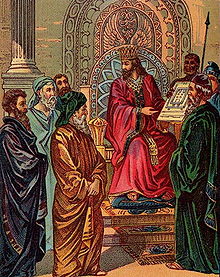Inheritance
practice of passing on property upon the death of individuals
(Redirected from Inherited)
Inheritance is the practice of passing on property, titles, debts, rights and obligations upon the death of an individual. It has long played an important role in human societies. The rules of inheritance differ between societies and have changed over time. Inheritance also refers to the hereditary passing on of physical and psychological characteristics from one generation to the next.


A
editD
edit- And all to leave what with his toil he won,
To that unfeather'd two-legged thing, a son.- John Dryden, Absalom and Achitophel (1681), Part I, line 169.
I
edit- What we have inherited from our fathers and mothers is not all that 'walks in us.' There are all sorts of dead ideas and lifeless old beliefs. They have no tangibility, but they haunt us all the same and we can not get rid of them. Whenever I take up a newspaper I seem to see Ghosts gliding between the lines. Ghosts must be all over the country, as thick as the sands of the sea.
- Henrik Ibsen, Ghosts (1881).
M
edit- The privilege of executors is too great already. They ought to be properly informed when they bring actions.
- Lord Mansfield, Hawes v. Saunders (1764), 3 Burr. Part IV., p. 1585; reported in James William Norton-Kyshe, Dictionary of Legal Quotations (1904), p. 92.
P
edit- Whenever the rate of return on capital is significantly and durably higher than the growth rate of the economy, it is all but inevitable that inheritance (of fortunes accumulated in the past) predominates over saving (wealth accumulated in the present). ... The inequality r > g in one sense implies that the past tends to devour the future: wealth originating in the past automatically grows more rapidly, even without labor, than wealth stemming from work, which can be saved. Almost inevitably, this tends to give lasting disproportionate importance to inequalities created in the past, and therefore to inheritance.
- Thomas Piketty, Capital in the Twenty-First Century (2013), p. 377.
S
edit- He lives to build, not boast, a generous race;
No tenth transmitter of a foolish face.- Richard Savage, The Bastard (1728), line 7.
- American families are in the process of passing along a $9 trillion legacy from one generation to the next. This is a lot of money, but it is distributed very unevenly.. ... Hand in hand with this money, I submit, what is really being handed down from generation to generation is the profound legacy of reproducing racial inequality. The legacy is difficult to discern because the language of family heritage hides it from our political consciousness.
- Thomas M. Shapiro, The Hidden Cost of Being African American: How Wealth Perpetuates Inequality (2005), p. 32
- Mainstream sociological theory sees differences in jobs, skills, and education as the primary causes of inequality, and substantial wealth transfers embarrass this theory. The classical sociologist Emil Durkheim, for example, predicted that family inheritances would decline over time in favor of giving to charitable and nonprofit organizations, but studies examining actual bequests invalidate this predication. ... In 1989 charitable bequests constituted less than 10 percent of proceeds of estates valued at over $600,000 in the United States.
- Thomas M. Shapiro, The Hidden Cost of Being African American: How Wealth Perpetuates Inequality (2005), p. 32
- He that troubleth his own house shall inherit the wind. And the fool shall be servant to the wise in heart.
W
edit- De male quæsitis vix gaudet tertius pæres,
Nec habet eventus sordida præda bonos.- What's ill-got scarce to a third heir descends,
Nor wrongful booty meets with prosperous ends.- Quoted by Thomas Walsingham, History, p. 260; reported in Hoyt's New Cyclopedia Of Practical Quotations (1922), p. 394.
- What's ill-got scarce to a third heir descends,